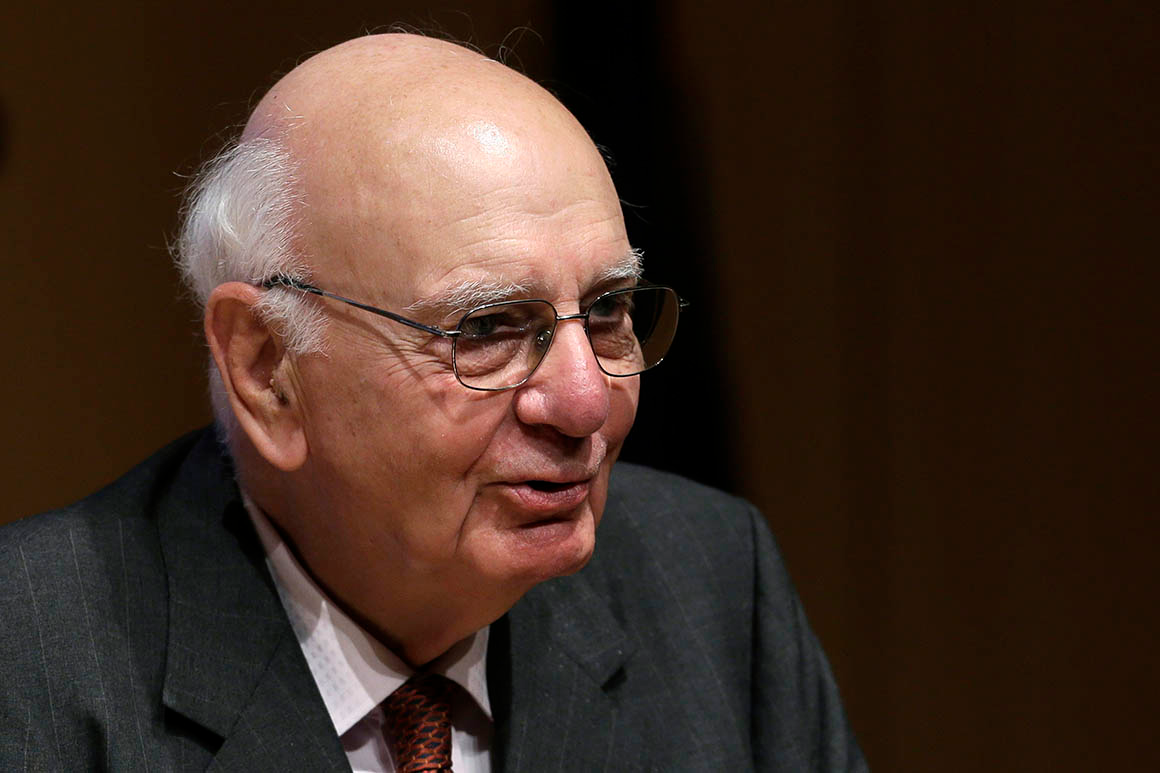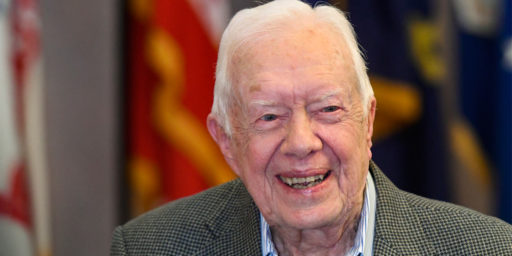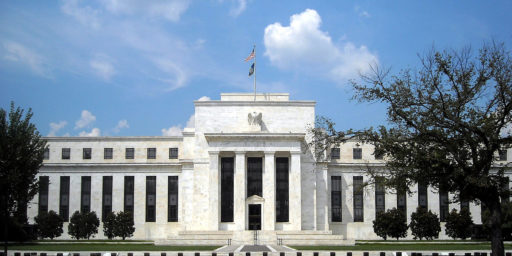Paul Volcker, Fed Chairman Who Slew The Inflation Dragon, Dies At 92
Paul Volcker, the Chairman of the Federal Reserve Board who put an end to the rampant inflation that threatened to choke the American economy, has died at 92.

Paul Volcker, who was appointed Chairman of the Federal Reserve Board by President Carter and went on to fight a war against the inflation that was choking the American economy in the 1970s until it was finally eradicated, has died at the age of 92:
Paul A. Volcker, a hard-headed economic statesman who as chairman of the Federal Reserve from 1979 to 1987 shocked the U.S. economy out of a cycle of inflation and malaise and so set the stage for a generation of prosperity, died Dec. 8 at his home in Manhattan. He was 92.
The cause was complications from prostate cancer, said his daughter, Janice Zima.
With influence that spanned five decades and seven presidents, Mr. Volcker left as deep an imprint on the U.S. economy and financial system as has anyone of his generation.
As a senior Treasury official in the 1960s and early ’70s, he advised President Richard M. Nixon on taking the United States off the gold standard. At the Fed, he was arguably the second-most-powerful person in the country.
As an adviser to presidential candidate Barack Obama, he gave the young senator credibility. He later counseled President Obama on his response to the 2008 financial crisis and proposed a key restriction on speculative activity by banks that would become known as the “Volcker Rule.”
Mr. Volcker was a giant of a man, standing 6-foot-7, with a stature that came from his mastery of finance, his doggedness in navigating bureaucracies and his sheer toughness. His was an imposing moral authority acquired the hard way, the reason in his later years that he was enlisted for such knotty tasks as unraveling the holdings of Holocaust victims in Swiss banks and investigating the United Nations’ oil-for-food program in Iraq.
Mr. Volcker’s greatest historical mark was in eight years as Fed chairman. When he took the reins of the central bank, the nation was mired in a decade-long period of rapidly rising prices and weak economic growth. Mr. Volcker, overcoming the objections of many of his colleagues, hiked interest rates to an unprecedented 20 percent, drastically reducing the supply of money and credit.
At a shocking, unscheduled Saturday night news conference announcing those steps just two months after taking office, in October 1979, Mr. Volcker was coy about the likely economic impact of the move.
“Well, you get varying opinions about that,” he told reporters that evening, asked if tighter money could cause a recession. The action indeed triggered what was then the deepest economic downturn since the Depression of the 1930s and drove thousands of businesses and farms to bankruptcy and the unemployment rate to over 10 percent.
Mr. Volcker was pilloried by industry, labor unions and lawmakers of all ideological stripes. He took the abuse, convinced that this shock therapy would finally break Americans’ expectations that prices would forever rise rapidly and that the result would be a stronger economy over the longer run.
On this biggest of questions, he was right.
Soon after Mr. Volcker took his foot off the brake of the U.S. economy in 1981, and the Fed began lowering interest rates, the nation began a quarter century of low inflation, steady growth, and rare and mild recessions. Economists attribute that period, one of the sunniest in economic history, at least in part to the newfound credibility as an inflation-fighter that Mr. Volcker earned for the Fed.
“He restored credibility to the Federal Reserve at a time it had been greatly diminished,” said William L. Silber, a New York University economist and author of the biography “Volcker: The Triumph of Persistence,” in a 2012 interview. “He served as the template for future central bank chairmen who came after him.”
(…)
In 1979, when President Jimmy Carter was looking for a new Fed chairman, prices were spiraling upward, almost out of control.
A vicious cycle was underway: Because prices had been rising rapidly in the recent past, workers demanded ever-higher wages.As the nation’s central bank, the Federal Reserve was the agency best positioned to try to end that demoralizing cycle, but it would exact a cost.
To reduce inflation, the Fed would need to raise interest rates to choke off the flow of money into the economy, probably prompting much higher unemployment. For that reason, the previous two men in the job, Arthur F. Burns and G. William Miller, had moved only timidly in trying to combat inflation. Miller left the job after a single ineffective year as Fed chair.
As Carter and his aides spoke with people in financial circles about potential nominees, Mr. Volcker’s name came up repeatedly. The president appointed Mr. Volcker, a decision that had been judged well by history but may well have cost Carter reelection in 1980.
Taking the job came at a personal cost for Mr. Volcker. He would have to take a 50 percent pay cut from his salary as New York Fed president, and his wife had to return to bookkeeping work to afford both their New York co-op and the small Foggy Bottom apartment. Mr. Volcker commuted back to New York on the weekends.
Just two months after taking office, Mr. Volcker was ready to make the boldest move of his tenure. He called his Fed colleagues from around the country to Washington for a secret, emergency policy meeting on a Saturday. After hours of argument and debate, he steered the Federal Open Market Committee to change the entire framework the Fed would use to control the nation’s money supply.
The Fed then, and now, set a target for short-term interest rates and then bought and sold securities to ensure that interest rates actually settled at that level. When the Fed wants to slow the economy and choke off inflation, it raises its interest rate target. Mr. Volcker concluded in October 1979 that the Fed needed to change strategies and start targeting the actual amount of money floating around in the economy.
The full obituary published by The Washington Post, as well as the one published by The New York Times are worth reading for anyone interested. Suffice it to say that, despite much resistance from political forces and forces inside the Fed who thought at times that he was advocating a monetary policy that was far too restrictive, Volcker was able to get his policies enacted and was ultimately proven right. In fact, though he has since been succeeded by a rotation of Fed Chairman including Alan Greenspan, Ben Bernanke, Janet Yellin, and Jerome Powell, the Federal Reserve remains largely committed to the anti-inflationary policies that he advocated. As a result, the rapid inflation that we saw in the 1970s has not been an issue for more than 30 years now and, based on current statistics seems unlikely to return.
Writing in The Washington Post, Sebastian Mallaby, who happens to be the Paul A. Volcker senior fellow for international economics at the Council on Foreign Relations, calls Volcker the economic savior we needed precisely at the time he came along:
Paul A. Volcker, the cross-legged giant who died Sunday at age 92, had been raised by a fiercely ethical town manager in a small New Jersey suburb: “Do not suffer your good nature . . . to say yes when you ought to say no,” ran a quotation from George Washington on the wall of his father’s office. As a student at Princeton, Volcker had imbibed the writings of the austere Austrian economist, Friedrich Hayek, who taught that inflation could only boost employment by disguising cuts in real wages. “Hayek’s words forever linked inflation and deception deep inside my head,” Volcker told his biographer William L. Silber.
Emerging from that confabulation, he unleashed what became known as his Saturday Night Special, a sharp break in the way that the Fed would conduct business. Rather than targeting a particular short-term interest rate, Volcker decreed that the Fed would henceforth impose a rigid cap on the supply of money. Although some contemporary economists hailed this “monetarism” as a magical elixir, Volcker’s intention was purely psychological. By announcing a scary new doctrine, Volcker intended to demonstrate that he was tough. He was delivering the drastic shock that Burns had deemed impossible.
The Saturday Night Special became a celebrated moment in Fed history. Over the following three years, the Fed drove inflation down from around 12 percent to around 6 percent. It was a grueling battle: At one point, Volcker’s monetary straitjacket caused the short-term interest rate to rise to 20 percent, prompting a congressman to accuse him of “legalized usury beyond any kind of conscionable limit.” The economy endured two recessions, and unemployment hit double digits; furious farmers drove their tractors to Washington and encircled the Fed’s headquarters. But by dint of iron-willed persistence, Volcker turned the inflationary 1970s into the disinflationary 1980s.
For the rest of his Fed tenure, extending to 1987, Volcker personified the cause of responsible economic policy. Lawmakers threatened to impeach him, but he sat stoically through congressional hearings in his cheap suits, puffing on Churchillian cigars and occasionally shaking his domed head as if to say he pitied the simpletons who abused him. When Sen. Lawton Chiles (D-Fla.) threatened to “cut the head off the Federal Reserve,” Volcker retorted that “even when the Federal Reserve is running around headless you will have exactly the same problem you started with.”
Volcker’s status was forever cemented by that bold Saturday Night Special, a rare moment of courage in the dog days of the Jimmy Carter era. Inflation was raging; the dollar was in free-fall; in August 1979, Gallup had reported that fully 84 percent of Americans thought the country was on the wrong track. That summer, the president himself had warned the nation of “a crisis of confidence . . . a crisis that strikes at the very heart and soul and spirit of our national will.”
Paul Volcker’s achievement was to remind Americans of their better selves by demonstrating that he lacked neither confidence nor will nor spirit.
Appointing Volcker was perhaps one of the most important things that President Carter did during his time as President. While it’s likely that the recession that the inflation-fighting policies that the newly installed Fed Chairman advocated and got approved by his fellow members of the Open Market Committee did lead to an economic downturn and record-high interest rates, they ultimately helped to put an end to a problem that threatened to undermine the entire American economy and the world economy as well. For that, he deserves recognition as one of the great economic figures of the 20th Century.






For which Carter has never gottten the credit he deserved.
I recommend William Greider’s Secrets of the Temple: How the Federal Reserve Runs the Country as a counter to the hagiography we’ll be seeing.
My employer’s president told us Reagan was doing the right things and we’d keep building unsold machines against the coming recovery. I went home and shotgunned out resumes. Got lucky and found a new job shortly before they went under, but had to move and sell a house on land contract because mortgage interest rates violated the state usury law. Building contractors were mailing pieces pf 2x4s to Volker protesting that they had nothing else to do with them. The “misery index”, unemployment plus inflation, invented by Republicans to make Carter look bad was through the roof.
It was almost entertaining to watch Volker’s shifting rationalizations for his predetermined policy. Seemed to be based on a new interpretation of a different money measure every month. Then the Mexican banks threatened to go under, forcing Volker to ease. He, and Uncle Milty Friedman, were sure inflation would restart. It didn’t. What Volker and Reagan did accomplish was make 6% unemployment look good. And they had their recession early so Reagan could get reelected in a recovery and brag about a miracle of Reaganomics, which consisted of very carefully looking only from the trough of the recession they quite deliberately caused to the peak before the Bush I recession.
The hagiography is bizarre. Since Volcker it has been official US government policy that if the assets of the rich are in danger from inflation the Fed will force businesses to fire en masse, wrecking the lives of the little guy.
@gVOR08: Misery index indeed: high inflation, high unemployment, and high interest rates*. Back then 6% mortgage rates were deemed a thing of the past that we would never see again. The ’70’s seemed to be a “dark ages” in this country: the doldrums if there ever was. President Carter and his people seemed to be in a quandary and totally perplexed about what to do. From what I have researched, they still don’t have a clear idea on the causes and solutions. That is the disturbing part.
If I remember correctly, Volker would sit at the Federal Reserve hearings holding a cigar.
Out of respect for Chairman Volker, I will dispense with my usual comments and ruminations about the Federal Reserve Bank and its various aspects and history. If anyone wants or somehow needs them I will post them in a few weeks.
* Add to all that the disastrous withdrawal from Vietnam.
@Tyrell: Trust us, Tyrell; we’ve got them already.
During the 70s, the stock market was flat. Inflation was bad, and the government appeared to have no idea about stemming the problem. Jerry Ford tried to talk the issue away by handing out “WIN-Whip Inflation Now” buttons. Volcker put the brakes on with harsh increases in the interest rates. This worked but certainly caused pain for many.
I was paying a 9% mortgage and was very attentive to due dates from various vendors. I even would take payment checks to mail in the evening of their due dates. The central post office was good about stamping late in the day. The Treasury was selling zero coupon bonds with a yield of 18%, and I had no cash/credit for what I knew was a great deal. I did finagle a margin buy of Exxon, but sadly my reputation only got me a few hundred shares which have split six times while paying a great dividend. Needless to say, I love Rex Tillerson.
Volcker applied radical surgery that worked, but things were scary and people got hurt. He was smart, had courage, and did what had to be done.
We bought our first house during that time. Assumed a 6% FHA mortgage (remember when you could do that?) and took an 10% contract for deed on the balance. That house was in an inner city neighborhood that had lots of investment properties. We hung onto it 1 year to long and the tax law changes in 87(?) cost us thousands and as many of those passive investors dumped housing in order to claim the loss against other income.